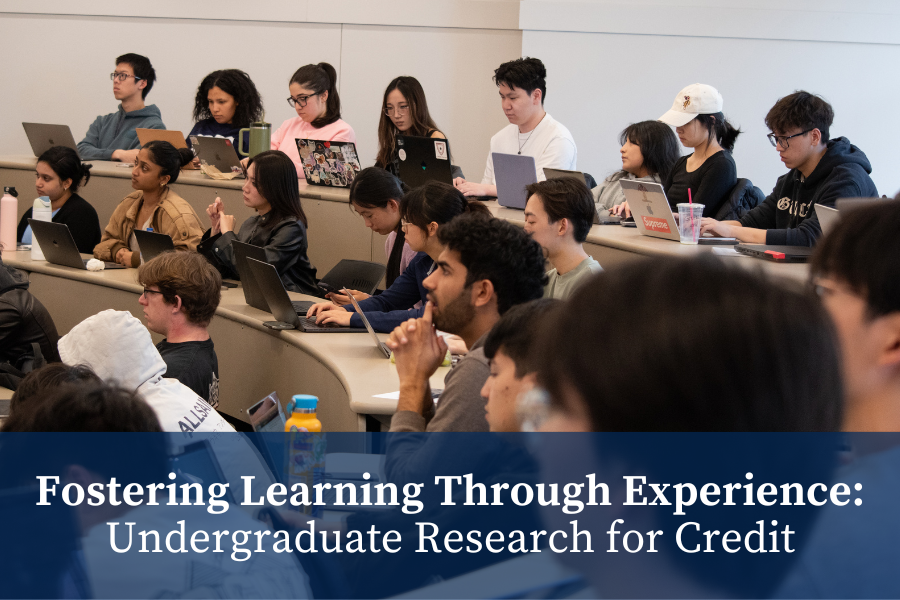
Fostering Learning Through Experience: Undergraduate Research for Credit
By Aleksaundra Handrinos
Media Inquiries- Communications Specialist
This past spring semester, a record twenty-nine students participated in the Carnegie Mellon Institute of Strategy and Technology’s (CMIST) Undergraduate Research for Credit course. For both students and faculty members, this opportunity offers a multitude of benefits for their professional work, personal learning, and community connection.
Building on the skills Carnegie Mellon University (CMU) undergraduates learn as part of their coursework, the research for credit course enables students to actively participate in academic research under the guidance of expert faculty, earning between three and nine units for their work. Faculty members offer a variety of project topics that range from exploration of the constitutional role of presidents to the potential impact of automated nuclear weapons launch systems on international politics.
Students typically select a project that speaks to their interests or choose to work with a specific faculty member who has inspired their learning. Tala Areiqat, a rising senior majoring in international relations and political science, sought to increase her research experience, and given the numerous available projects, she “thought it would be a really cool and rewarding experience to learn what goes into creating the projects that we so often see our professors publishing or talking about in class.”
She ultimately worked with Assistant Professor Ignacio Arana this past spring to conduct research on the psychology of presidents. Her involvement in this project honed her communications skills as she learned how to ask questions to ensure successful achievement of the project goals. Having developed the capacity to efficiently review resources and synthesize key points in her classes, Areiqat was well-prepared to contribute to the project while significantly improving her ability to search for sources. In turn, student research can enable faculty members like Arana to accelerate the process of analyzing literature and collecting data.
Research for credit often gives students the chance to follow a research project through multiple stages. For example, Siena Macaulay, who also worked as a research assistant to Arana this past semester, helped create a document that compiled all countries into the Global North and Global South. She then worked to develop “a more equitable word to use in academic publishing as the term Global South comes with prejudice and is simply wrong in some cases.” In addition to gaining research experience, Macaulay, a rising junior majoring in international relations and political science, appreciated that the Undergraduate Research for Credit course provided an opportunity to connect with other students and to meet one-on-one with professors.
CMIST professors likewise find participating in Undergraduate Research for Credit to be rewarding. Beyond the practical support with sourcing information for particular projects, Arana has enjoyed “the opportunity to discuss ideas with smart, engaged students.” He takes student feedback seriously when considering the relevance and feasibility of his work. “If they find a topic exciting, relevant, or unconvincing, I factor that into my project development,” he shared.
Similarly, Joshua Schwartz, CMIST assistant professor, appreciates how students can introduce new perspectives and insights that he may not have previously considered. “Students can contribute intellectually to the project rather than simply doing busy work,” he said. Schwartz observed that leading these research projects also helps him improve his own teaching skills. “Working with students forces me to more clearly describe the academic research process to people that have less experience in this field than me, which is one of the challenges professors face in the classroom,” he said. By speaking informally with students, Schwartz noted that he is also able to gauge what's working and not working for them, both in the classroom and at CMU as a whole.
Students who participate in the Undergraduate Research for Credit course can expect to learn more about topics that they are curious or passionate about, while gaining skills that transfer to the classroom and beyond. For example, Ellie Kim, a rising junior majoring in ethics, history, and public policy with an additional major in international relations and political science, found that the practice of searching for and analyzing primary and secondary sources was extremely helpful to her coursework. “Having this experience allowed me to grow not only in my knowledge about a topic I was interested in, but also how research works in political science,” she said. Kim worked with Assistant Professor Justin Canfil on research exploring ambiguity in international politics and found the project so interesting that she is continuing to work on it over the summer. “Undergraduate Research for Credit gave me the opportunity to learn what fields interest me and which fields I would want to pursue in future academic projects and in my professional career,” she said.
CMIST’s Undergraduate Research for Credit offers mutual advantages for students and faculty members and, as a result, has experienced remarkable growth, more than doubling the number of participants since its inception. While a significant portion of these students are enrolled in CMIST degrees, the program's appeal is campus-wide, with participating majors spanning vocal performance to architecture. From cultivating a strong community and advancing academic scholarship to providing invaluable, flexible experience tailored to each student's unique aspirations, Undergraduate Research for Credit assists both students and faculty as they contribute to the research being conducted at CMU.
Undergraduate students interested in conducting research for credit with a CMIST faculty member can find more information, including a list of research topics with open positions as well as next steps, on our professional development webpage.
